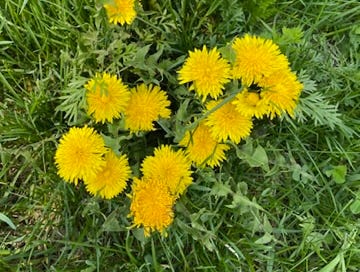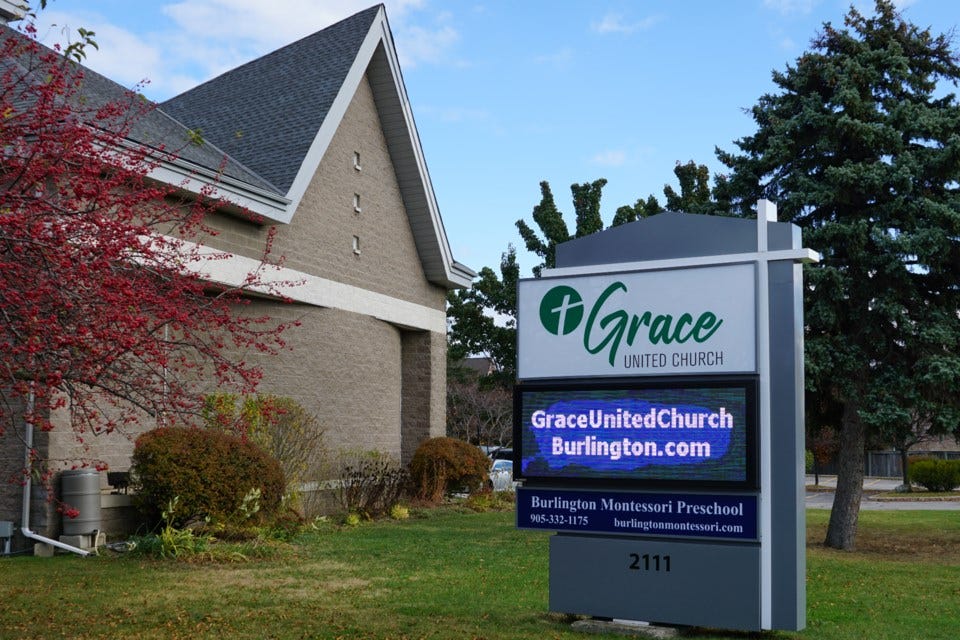All Things Are Possible with God
The sermon I preached for Earth Sunday in Burlington, Ontario, and what I learned there about the problem with dandelions
A few weeks ago, I was in Burlington, Ontario, to preach for Earth Sunday at Grace United Church. I met with their advocacy committee over supper the night before to explore how they can encourage their community to take climate action. Then, after the worship service, I led a Lunch and Learn event on exploring different kinds of climate action and how to become willing to be more uncomfortable in our discipleship of climate action. The people at Grace were open and committed to exploring the ideas I presented. I always learn at such events too, and came away with things to consider in my work. I’m grateful to Kathryn and Janice, who invited me, to their minister, Rev. Richard Bott, who suggested they reach out, and to the people at the Lunch and Learn who explored with me.
Sometimes I learn things I didn’t expect! It turns out that Kathryn has taken horticulture courses, and shared with me the fact that dandelions are not a native plant, and despite my waxing eloquently over the delights of the dandelion in our theme conversation, they wreak havoc in local ecosystems! Since I didn’t know this, I imagine some of my readers may not know this either. Thus, for this week, I want to share with you what I learned.
We are in a climate and ecological crisis, and it’s all hands on deck... Subscribe to join a community of people of faith who care about climate action and find hope and encouragement at the same time!
The Problem of Dandelions
We all know that dandelions are considered weeds, and are the bane of many a lawn-owner’s existence. I had naively assumed that the definition of a weed was simply a plant that grew where we didn’t want it, like in our lawns. However, the dandelion isn’t just a weed because it grows in grass lawns; it turns out that it is a highly invasive plant that crowds out native plants; is difficult to eradicate, leading to the common use of chemical pesticides that cause harm to the environment; and tends to attract honey bees, rather than native bees, which is a big problem.
Honey bees actually destabilize natural ecosystems by competing with native bees. While honey bees get the attention in the press and media when there is talk of supporting bees, they are actually a threat to our native bees, many of which are species at risk. I recognize the importance of honey bees to the production of honey and the pollination services beekeepers offer agriculture. But we need to recognize the negative impacts as well. If you truly want to support bees, native pollinators and be bee friendly, just plant native plants.1
Dandelions do have food value (we can eat the leaves, flower heads, and make dandelion wine), but so do many native plants. What I learned from Kathryn and Clean North, an environmental awareness group in southern Ontario, is that we should do what we can to eradicate dandelions (without the use of chemicals) and plant native plants that are suitable for the growing zone you live in.
Dandelions are native to Europe and Asia, and arrived in North America with Europeans. Dandelion pollen is harmful to native bees.
I was using the metaphor of the dandelion for steadfastness, determination, and the willingness to be ‘difficult to eradicate’ in the fight for climate justice. However, what I learned about dandelions shows that they are not the right plant to use as a metaphor. They represent colonization more than the cause of climate justice. I need a different metaphor here. I have some ideas, such as the Three Sisters image, of the ways that squash, beans and corn grow together, taught to settlers by our Indigenous neighbours.2
What native plant offers you an image of climate justice?
What agrarian image in the Bible can inspire us in our discipleship of climate action?
All Things Are Possible with God
This is the sermon I preached for Earth Sunday this year. It is the most prophetic sermon I have preached on the climate crisis to date.
Scripture Readings: Mark 10:17-31 & Hebrews 4:12-16
Let us pray:
God of Life, may the words of my mouth, and the meditations of all our minds and hearts, lead us deeper understanding of you, and the love you call us to live. AMEN.
Christians are called to a radical discipleship of climate action. Discipleship, which is how we live out our faith in our actions, is a call from God. Jesus Christ calls us to follow him in our lives and actions. Modelled on his life and ministry of love, justice, mercy, and compassion, we are called to respond to the cries of the world in our time and place.
Today, we hear the cries of the world in the climate crisis. We hear the cries from the whole Earth community, both human, especially among the billions who are the least responsible for the climate emergency but who are suffering the worst effects, and the more than human world, who are suffering from species extinction, loss of habitat, and the poisoning of waters and soil as a result of human activity. This Earth Sunday, we open our ears and our hearts to hear the cries of the world and respond.
We respond, or at least we ought to respond, with climate action. We ought to respond with action that will radically reduce greenhouse gas emissions. We ought to respond by radically transforming the energy that we use and how much of it. We ought to respond by changing our dietary practices. We ought to respond by radically reducing our consumption levels, what and how much we buy. We ought to respond by building resilient adaptation measures in our communities, especially for the most vulnerable.
And we ought to respond by holding governments and big business responsible for the myriad ways that they are funding and supporting gas and oil, and the multinationals that are flooding our planet with single-use plastics, clear-cutting the Amazon, and destroying local and Indigenous communities in the pursuit of more and more resources.
In our time of climate crisis, and our place as the privileged in the global north, this is how Jesus is calling us to follow him today. This is the discipleship that we are called to live out in our lives.
Now I know we all know this, already! I was invited by Kathryn and Janice to preach a word on this and to lead our Lunch and Learn after the service, because this is a topic that is important to many of you. But I wonder if we really understand what is required of us. I wonder if we really understand just what it is that Jesus is calling each one of us to, in this time of climate emergency.
Need to find encouragement and hope in this time of climate and ecological crisis? Want to support this eco-ministry that is international and ecumenical and have access to the full breadth of my work? With a paid subscription, you’ll get more of the encouragement you need, find hope in this difficult time, and make this ministry possible!
Can’t upgrade right now, but would like to offer one-time support? Thank you! You can do so here:
Keep reading with a 7-day free trial
Subscribe to Faith. Climate Crisis. Action. to keep reading this post and get 7 days of free access to the full post archives.












